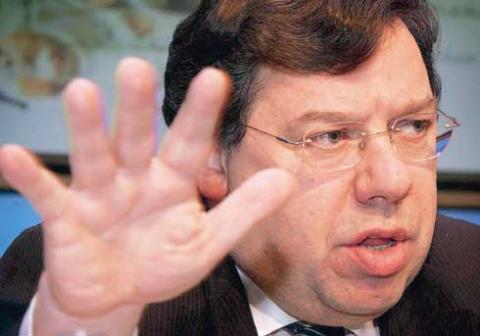Opposition call for protests and an immediate general election as IMF bailout confirmed

Last night the Irish government confirmed that it has applied for a bailout from the International Monetary Fund and the European Union and that this request has been approved by the EU. The amount of funding has not yet been decided but it is estimated that it could range as high as €90 billion. By Alison Spillane.
In a press release on the Labour party website, Finance spokesperson Joan Burton described the government's action as the "final epitaph for a Fianna Fáil Government that has plunged the country into the financial abyss and that has consistently and deliberately lied to the Irish people".
She has requested that Taoiseach Brian Cowen make a full statement to the Dáil today and that TDs be given the opportunity to discuss the rescue package. She added that it was imperative a new government be elected as soon as possible.
Sinn Féin has called for state-wide protests against the government's application for external assistance from 1pm today. In a statement on the party's website, SF Dáil leader Caoimhghín Ó Caoláin said: "The Fianna Fáil/Green Government has no political authority and no democratic mandate to act in the name of the Irish people and to incur further massive debt on this and future generations." He called on the government to resign and a general election to be held.
Earlier on Sunday, Fine Gael's deputy leader James Reilly said the government should resign before the budget on 7 December. Speaking to Reuters, Dr Reilly said it was possible to hold a general election within three weeks.
Speaking from Limerick, the party's Finance spokesperson Michael Noonan expressed surprise at the speed with which the government made its application. Delegates from the International Monetary Fund arrived in Dublin on Thursday; by Sunday the details of an application for aid had been negotiated. Speaking this morning on the Pat Kenny radio programme, James Reilly concurred with Michael Noonan, saying that the government must have been in consultation with the IMF prior to Thursday, despite government denials that a bailout was being discussed (see video of Brian Lenihan on 17 November below).
Speaking at a press conference at Government Buildings yesterday evening, the Taoiseach said the details of the rescue package will be negotiated over the next few weeks. He added that the question of changing Ireland's corporation tax rate had not arisen.
In an interview on RTE radio yesterday afternoon, Finance Minister Brian Lenihan indicated that the minimum wage, currently €8.65 per hour, may be reduced in the forthcoming budget. Monday's newspapers also reported that social welfare may be decreased. Some government backbenchers strongly oppose any cuts to the state pension but are not as exercised about protecting the minimum wage and social welfare upon which many working poor and unemployed rely to keep them above the poverty threshold.
